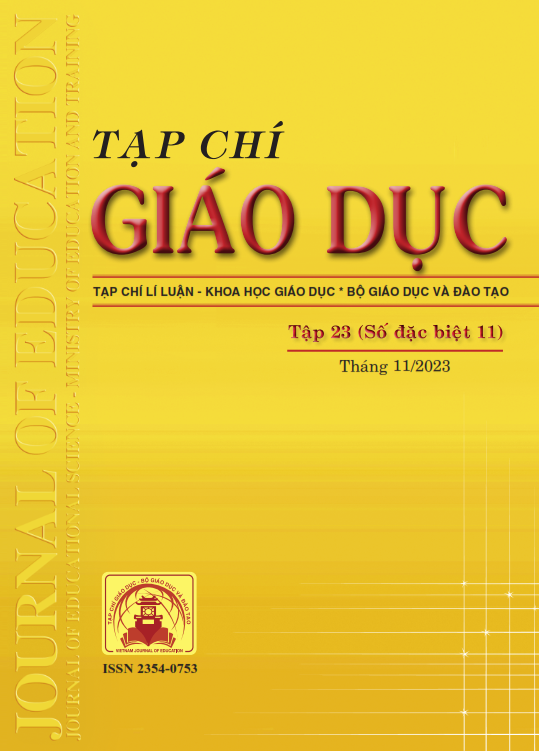Thực trạng và đề xuất phương án giáo dục 3R nhằm giảm thiểu rác thải nhựa cho học sinh trung học phổ thông qua hoạt động trải nghiệm
Tóm tắt
3R education for high school students is one of the effective measures to cope with the increasingly severe plastic waste pollution in Vietnam today. Research results show that students in high schools in the Central region have a relatively high awareness of plastic waste. However, their knowledge, behavior, and level of access to education about plastic waste are still limited. From there, the article analyzes the ability of 3R education to reduce plastic waste for students through experiential activities in high schools, demonstrated through educational content, design process, organization, and implementation method. The research results can be a reference for high schools to conduct educational activities to reduce plastic waste and build “green, clean, beautiful schools”.
Tài liệu tham khảo
Bộ GD-ĐT (2018). Chương trình giáo dục phổ thông - Hoạt động trải nghiệm và hoạt động trải nghiệm, hướng nghiệp (ban hành kèm theo Thông tư số 32/2018/TT-BGDĐT ngày 26/12/2018 của Bộ trưởng Bộ GD-ĐT).
Bộ Môi trường Nhật Bản (2021). Cùng học về 3R (Cỏ Dại dịch). NXB Phụ nữ.
Chau, M. Q., Hoang, A. T., Truong, T. T., & Nguyen, X. P. (2020). Endless story about the alarming reality of plastic waste in Vietnam. Energy Sources, Part A: Recovery, Utilization and Environmental Effects, 1-9. https://doi.org/10.1080/15567036.2020.1802535
Chow, C. F., So, W. M. W., Cheung, T. Y., & Yeung, S. K. D. (2017). Plastic waste problem and education for plastic waste management. In Emerging Practices in Scholarship of Learning and Teaching in a Digital Era (pp. 125-140). Springer. https://doi.org/10.1007/978-981-10-3344-5_8
Dang, V. H., Gam, P. T., & Xuan Son, N. T. (2021). Vietnam’s Regulations to Prevent Pollution from Plastic Waste: A Review Based on the Circular Economy Approach. Journal of Environmental Law, 33(1), 137-166. https://doi.org/10.1093/jel/eqaa028
Hammami, M. B. A., Mohammed, E. Q., Hashem, A. M., Al-Khafaji, M. A., Alqahtani, F., Alzaabi, S., & Dash, N. (2017). Survey on awareness and attitudes of secondary school students regarding plastic pollution: implications for environmental education and public health in Sharjah city, UAE. Environmental Science and Pollution Research, 24(25), 20626-20633. https://doi.org/10.1007/s11356-017-9625-x
Jambeck, J. R., Geyer, R., Wilcox, C., Siegler, T. R., Perryman, M., Andrady, A., Narayan, R., & Law, K. L. (2015). Plastic waste inputs from land into the ocean. Science, 347(6223), 768-771. https://doi.org/10.1126/science.1260352
Milne, G. Q. (2019). PLASTICS A GROWING CONCERN - A Vietnam Perspective. Ipsos|Plastic A Growing Concern, https://www.ipsos.com/sites/default/files/2019-09/. www.ipsos.com
Schwenkel, C. (2018). Waste infrastructure breakdown and gendered apathy in Vietnam. In In The routledge handbook of & anthropology and the City (Eds.), The Routledge Handbook of Anthropology and the City. New York: Routledge.
Situmorang, R. O. P., Liang, T. C., & Chang, S. C. (2020). The difference of knowledge and behavior of college students on plastic waste problems. Sustainability (Switzerland), 12(19), 7851. https://doi.org/10.3390/SU12197851
Trung tâm Nghiên cứu Phát triển Xã hội. (2019). Sổ tay Giảm thiểu - Phân loại - Tái chế rác thải nhựa. NXB Thuận Hoá.
Van, L., Hamid, N. A., Ahmad, M. F., Aizat Ahmad, A. N., Ruslan, R., & Muhamad Tamyez, P. F. (2021). Factors of single use plastic reduction behavioral intention. Emerging Science Journal, 5(3), 269-278. https://doi.org/10.28991/esj-2021-01275
Vương, Q.-H. (2021). Western monopoli of climate science is creating an eco-deficit culture - ELCI. Economy, Land & Climate Insight. https://elc-insight.org/western-monopoli-of-climate-science-is-creating-an-eco-deficit-culture/
World Bank (2022). Analisis of plastic waste pollution in Vietnam. https://documents1.worldbank.org/curated/en/099731506282258321/pdf/P167307016be7609b087c101a167c06027a.pdf
WWF-Việt Nam (2022). Sổ tay hướng dẫn giảm nhựa dành cho người tiêu dùng.
Đã Xuất bản
Cách trích dẫn
Số
Chuyên mục
Giấy phép

Tác phẩm này được cấp phép theo Ghi nhận tác giả của Creative Commons Giấy phép quốc tế 4.0 .












